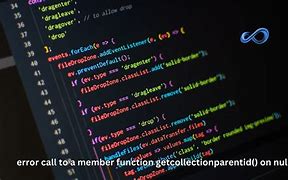Table of Contents
Error Call to a Member Function getCollectionParentId() on Null The error message “Call to a member function getCollectionParentId() on null” is a common issue encountered by developers working with object-oriented programming, particularly in languages like PHP. This error occurs when code attempts to invoke a method on an object that hasn’t been properly initialized or has been set to null. Understanding the root cause of this error and how to resolve it is crucial for maintaining robust and error-free code. This article will delve into the details of this error, its implications, and strategies for troubleshooting and fixing it
.
Identifying the Source of the Error
To effectively address the error, it’s important to understand what “getCollectionParentId()” is and why calling it on a null object results in a failure. The method getCollectionParentId() is typically a function defined in a class, meant to retrieve a parent collection ID for a given object. When the object on which this method is called is null, it means that it has not been instantiated or has been set to null somewhere in the code. This lack of initialization results in a runtime error when the method is invoked.
Error Call to a Member Function getCollectionParentId() on Null
Several scenarios can lead to this error:
- Uninitialized Variables: Error Call to a Member Function getCollectionParentId() on Null A common cause is attempting to use an object that has not been properly initialized. For instance, if a function or method is expected to return an object but instead returns
null, any subsequent method calls on thisnullvalue will result in the error. Error Call to a Member Function getCollectionParentId() on Null - Conditional Logic Errors: In some cases, logic conditions might cause an object to be set to
nullunder certain circumstances, but subsequent code does not account for this possibility. Error Call to a Member Function getCollectionParentId() on Null - Data Retrieval Issues: If an object is retrieved from a database or an API and the retrieval fails or returns no results, the object might be
null, leading to this error when methods are called on it. Error Call to a Member Function getCollectionParentId() on Null
Debugging the Error
To resolve the “Call to a member function getCollectionParentId() on null” error, debugging is essential. Here are steps to identify and fix the issue: Error Call to a Member Function getCollectionParentId() on Null
- Trace the Source: Begin by tracing where the object that should be calling
getCollectionParentId()is being initialized. Look for the variable assignments and ensure that the object is being properly instantiated before the method call. - Check Function Returns: If the object is returned from a function, check the function’s return values. Ensure that it does not return
nullwhen it is expected to return a valid object. Adding checks or default values can help preventnullreturns. - Add Null Checks: Incorporate null checks in your code before calling methods on objects. This can be done using conditional statements to verify that the object is not
nullbefore invoking methods.phpCopy codeif ($object !== null) { $parentId = $object->getCollectionParentId(); } else { // Handle the null case, perhaps log an error or set a default value }Error Call to a Member Function getCollectionParentId() on Null - Examine the Call Stack: Review the call stack where the error occurs to understand the sequence of function calls leading to the error. This can help pinpoint the exact location and context where the object becomes
null. Error Call to a Member Function getCollectionParentId() on Null
Best Practices to Prevent the Error
Implementing best practices can significantly reduce the chances of encountering this error in the future:
- Initialize Objects Properly: Ensure that all objects are properly initialized before they are used. This includes setting default values or handling cases where initialization might fail. Error Call to a Member Function getCollectionParentId() on Null
- Use Dependency Injection: Consider using dependency injection to manage object creation and lifecycle. This approach helps ensure that objects are properly instantiated and passed where needed.
- Implement Robust Error Handling: Develop a robust error-handling strategy that includes validation checks and meaningful error messages. This will help in identifying issues quickly and providing useful feedback for debugging.
- Write Unit Tests: Implement unit tests that cover various scenarios, including edge cases where objects might be
null. Automated tests can help catch these issues early in the development process.
Real-World Example
To illustrate, let’s consider a PHP-based e-commerce application where the error might occur:
phpCopy code// Function to get collection parent ID
function getCollectionParentId() {
// Assuming $collection is an object
return $collection->getCollectionParentId();
}
// Somewhere in the code
$collection = fetchCollection(); // This function might return null if no collection is found
$parentId = getCollectionParentId(); // This will throw an error if $collection is null
In this example, fetchCollection() might return null if no data is found. To fix the error, you should add a null check:
phpCopy code// Updated function
function getCollectionParentId() {
global $collection;
if ($collection !== null) {
return $collection->getCollectionParentId();
} else {
// Handle the null case
throw new Exception("Collection object is null");
}
}
Conclusion: Addressing and Preventing Null Reference Errors
The error message “Call to a member function getCollectionParentId() on null” is a clear indication of issues related to null object references in your code. By understanding the causes, implementing effective debugging strategies, and adhering to best practices, you can address this error and prevent it from occurring in the future. Proper initialization, null checks, and robust error handling are key components in developing reliable and error-free software. By applying these principles, you can ensure that your code remains resilient and performs as expected, minimizing disruptions and enhancing overall software quality.
